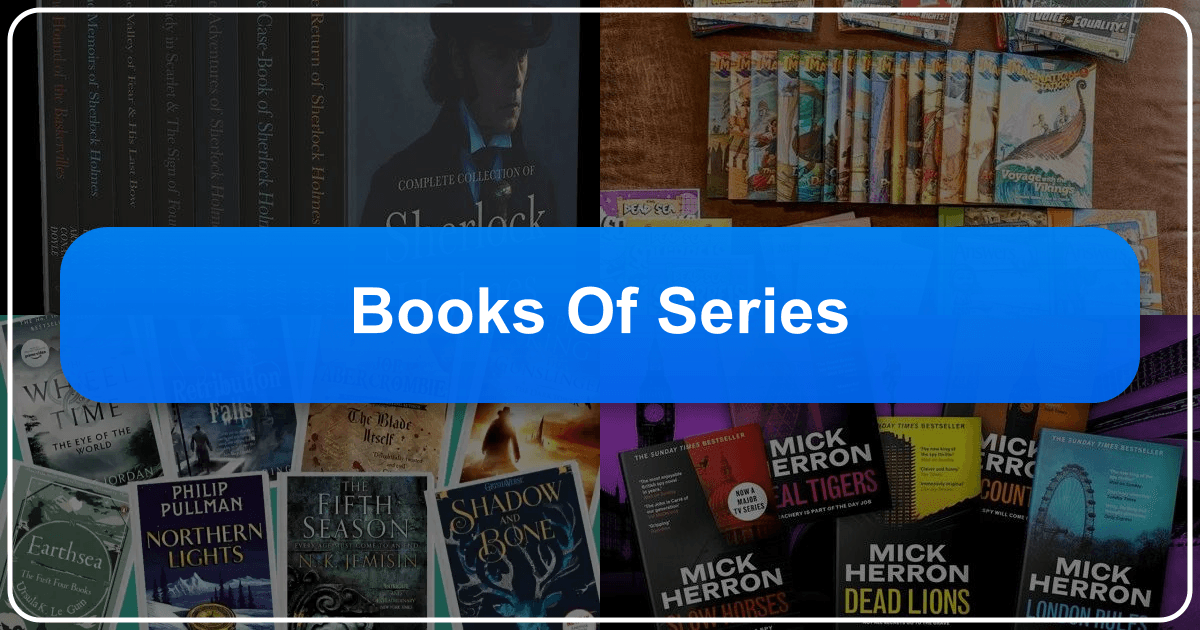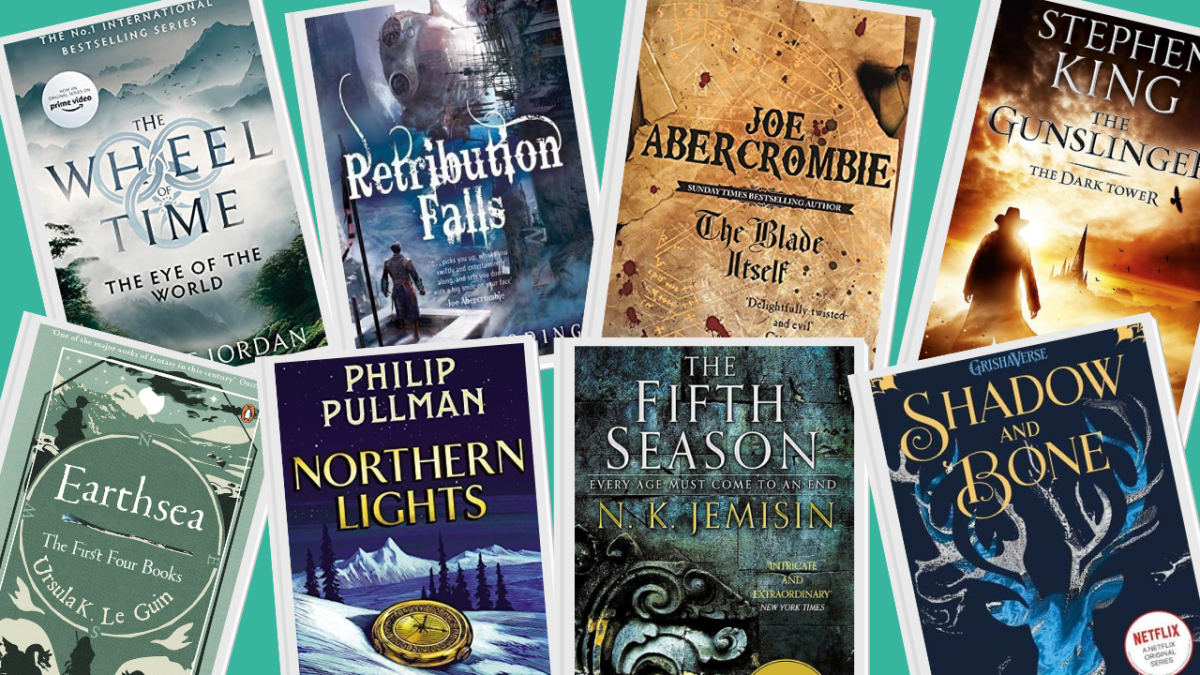Books of Series: A Deep Dive into Multi-Book Narratives

The allure of a book series is undeniable. Unlike the satisfying closure of a standalone novel, a series offers a prolonged engagement with beloved characters, richly developed worlds, and evolving narratives that unfold over multiple volumes. This immersive experience allows for a deeper exploration of themes, character arcs, and intricate plotlines, fostering a unique connection between the reader and the fictional universe. This article delves into the multifaceted world of book series, exploring their various forms, the advantages they offer authors and readers alike, and providing a curated selection of notable series across diverse genres.
The Many Faces of a Book Series: Defining the Narrative Structure

The term “book series” encompasses a broad spectrum of narrative structures. While some series are tightly interwoven, with each book directly building upon the previous one, others adopt a more episodic approach, featuring recurring characters within a shared universe but with self-contained storylines. Understanding these nuances is crucial to appreciating the diverse appeal of series literature.
The Interconnected Narrative: A Seamless Continuation
In this type of series, each book acts as an essential chapter in a larger, overarching story. The events and consequences in one volume directly influence and shape the narratives in subsequent books. Characters evolve, relationships deepen, and the central conflict builds to a climactic resolution across the entire series. Examples include Hilary Mantel’s Cromwell Trilogy, where the themes and character developments seamlessly flow from Wolf Hall to Bring Up the Bodies and finally The Mirror and the Light, creating an almost seamless narrative experience. This type of series demands a chronological reading order to fully grasp the progression of the story.

The Episodic Series: Standalone Stories within a Shared Universe
Conversely, an episodic series consists of standalone novels featuring recurring characters within a consistent setting or universe. While each book offers a complete narrative arc, the interconnectedness lies in the shared characters, locations, or overarching themes that subtly tie the stories together. Readers can often approach these books out of order without compromising their enjoyment, although a sequential reading might provide additional depth and context. Many crime series, such as the numerous books featuring Nero Wolfe by Rex Stout, fall into this category, with each mystery solvable independently while still allowing for the growth and development of the main characters across the entire series.

The Hybrid Approach: Blending Interconnection and Episodic Elements
Many book series cleverly blend elements of both interconnected and episodic narratives. A central storyline might drive the overall series, while individual books also offer self-contained plots that explore specific aspects of the wider world. This approach provides both the satisfaction of a cohesive overarching narrative and the flexibility of exploring self-contained stories within that world, similar to the works of Douglas Adams’ Hitchhiker’s Guide to the Galaxy, where each book has its own primary plot, but all are connected by the overall theme and recurring characters, such as Arthur Dent. This hybrid format appeals to a broader audience, allowing for both binge-reading and casual engagement.
Defining the Line: When Does a Series Become a Single Novel?
A crucial point of consideration is the extent to which a series feels like a single, lengthy novel divided into several volumes. In some cases, the boundary between a multi-book series and a single novel presented in parts becomes somewhat blurred. This is particularly true in series where the narrative flows seamlessly across volumes, with minimal time gaps between events and persistent thematic threads connecting the installments. Certain series, such as Ford Madox Ford’s Parade’s End, might be viewed as either a series of novels or a single extended work, depending on the reader’s perspective. The question is less about the technical definition and more about the reader’s overall experience.
The Advantages of Book Series: Benefits for Authors and Readers
The popularity of book series stems from the numerous advantages they offer both authors and readers. For authors, series writing provides a platform to explore complex themes and character arcs in greater depth, allowing for a richer and more nuanced portrayal of the fictional world. For readers, series provide a prolonged immersion in beloved narratives, fostering a deep connection with characters and universes that resonates long after the final page is turned.
For Authors: Expanded Creative Exploration and Sustainable Career
- Expanded Worldbuilding: Series offer an unparalleled opportunity for worldbuilding. Authors can create intricate and detailed universes that are explored and expanded upon across multiple volumes.
- Deeper Character Development: Characters can undergo significant transformation and growth over the course of a series. Readers witness their evolution, struggles, and triumphs, fostering a strong emotional connection.
- Sustained Income and Audience: Series offer a more predictable income stream for authors and create a loyal readership who eagerly anticipate each new installment.
- Thematic Depth: Series can explore complex themes across different perspectives and storylines, providing richer insight and understanding.
- Creative Flexibility: The multi-book format allows for experimentation with different narrative styles and subplots within the overall framework.
For Readers: Prolonged Engagement and Emotional Connection
- Immersive Experience: Series offer a more immersive reading experience than standalone novels. Readers spend significant time within the fictional world, forming strong connections with characters and settings.
- Emotional Investment: Readers develop deep emotional bonds with the characters, experiencing their joys, sorrows, and struggles, enhancing the emotional impact of the narrative.
- Anticipation and Excitement: The wait for each new installment builds anticipation and excitement, extending the enjoyment of the series beyond individual books.
- Community Building: Series often generate vibrant online communities where readers discuss their favorite aspects of the series, share theories, and connect with like-minded individuals.
- Re-readability: Series are highly re-readable. Readers can revisit the world, characters, and storylines multiple times, discovering new details and appreciating the evolving narrative with each read.
A Selection of Notable Book Series Across Genres
To showcase the diverse landscape of book series, here’s a curated selection of notable titles across various genres, each exemplifying unique narrative structures and thematic approaches:
(Note: This is not an exhaustive list, and many worthy series could be included. The choices here represent a diverse range of styles and appeals.)
Fantasy: The Stormlight Archive by Brandon Sanderson, His Dark Materials by Philip Pullman, The Wheel of Time by Robert Jordan
Science Fiction: Dune by Frank Herbert, The Expanse by James S.A. Corey, Earthseed by Octavia Butler
Mystery: Thursday Next by Jasper Fforde, The Nero Wolfe Mysteries by Rex Stout, Maisie Dobbs by Jacqueline Winspear
Romance: The Outlander Series by Diana Gabaldon, The Selection by Kiera Cass, These is My Words by Nancy Turner
Thriller: The Benny Griessel series by Deon Meyer, The Finlay Donovan series by Elle Cosimano, The Girl with the Dragon Tattoo series by Stieg Larsson
Literary Fiction: The Neapolitan Novels by Elena Ferrante, Old Filth by Jane Gardam, Little Women by Louisa May Alcott
This curated selection highlights the breadth and depth of book series across diverse genres. Each series possesses its unique narrative approach, from closely interwoven storylines to more episodic structures, providing a varied and engaging reading experience for various tastes.
Conclusion: The Enduring Power of Series Literature
The enduring appeal of book series lies in their ability to create prolonged immersion and emotional investment for readers. Authors harness the power of series to explore intricate themes, develop richly complex characters, and weave intricate plotlines that unfold across multiple volumes. The resulting narrative experience transcends the boundaries of individual books, leaving a lasting impact on the readers’ hearts and minds. Whether one prefers the tightly interwoven structure of a cohesive saga or the flexibility of standalone stories within a shared universe, the world of book series offers an unparalleled opportunity to experience the profound power and enduring appeal of storytelling.